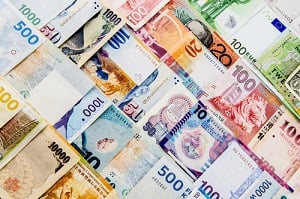With the volatile Greek debt crisis raising concerns over the stability of the global financial system, finding the safest currencies to invest in has taken on a new sense of urgency.
As a type of safe-haven investment, the safest currencies are a place where you want to have at least some money when markets are unraveling and mainstay currencies like the euro are falling.
 But how can an investor know which are the safest currencies?
But how can an investor know which are the safest currencies?
And since the financial crisis of 2008, many central banks have gone to great lengths to devalue their currencies in an attempt to stimulate their economies. These "currency wars" have undermined the value of many of the world's major currencies.
The safest currencies tend to reside in stable nations with strong economies. The central bank of a nation with a safe currency should have a strong balance sheet, with more assets than liabilities.
The safest currencies also stand out whenever there is financial turmoil in the world. They're the ones that rise in value while less reliable currencies fall.
That sounds pretty clear, but there are anomalies.
The most obvious is the U.S. dollar, which many consider a safe-haven currency. Sure enough, the dollar tends to rise when there's trouble in the world. And the U.S. economy, the world's largest, is also among the most stable.
But the U.S. Federal Reserve, the central bank of the United States, raises questions about just how safe the dollar is in the long run. After several rounds of quantitative easing, the Fed has more than $4 trillion in U.S. Treasury debt and mortgage-backed securities on its balance sheet.
And of course, the U.S. government has a debt of $18.3 trillion. So while the U.S. dollar is better off than most other currencies, it's not necessarily the safest currency.
A true safe-haven currency should not have any of these vulnerabilities.
And it so happens that there are several to choose from, each with its own advantages...
Assessing the World's Safest Currencies Today
Here's a closer look at the safest currencies in the world right now:
- The Swiss franc is one of the best-known safe-haven currencies. A stable nation with a strong banking system has made the Swiss franc a safe currency for decades. But over the past year, its stellar reputation has forced some radical moves on the part of the Swiss National Bank. The SNB has imposed negative interest rates and has unpegged the Swiss franc from the euro. That's made it more difficult and costly to invest in Swiss francs.
- The Norwegian krone, on the other hand, sits in the sweet spot of safe currencies today. The government is very stable, and the central bank has a very strong balance sheet - the country has no net debt. And since the krone is a standalone currency - it is not connected to the euro in any way -- it's not tied to problems elsewhere. As safe-haven currencies go, the krone is close to ideal.
- The Singapore dollar is also a good choice. Not only is Singapore one of the most stable places in Asia (both politically and financially), but it's a major hub of banking and trading.
- A more unconventional choice is the Polish zloty. But Poland has low government debt, a constitutional limit on borrowing, and strong economic growth. Better still, Poland's economy is based mostly on internal demand, insulating its financial system from problems elsewhere in Europe.
- And then there's gold. While not a currency strictly speaking, gold is most certainly a store of value. It has served as a safe-haven investment for thousands of years. Gold also has the advantage of not being controlled by a central bank or national government. And it's relatively easy to buy.
- A new type of safe-haven currency is the all-digital Bitcoin. Like gold, Bitcoin is not controlled by any central authority. But it's more of a currency than gold, as thousands of merchants around the world accept it as payment. Its limited supply - only 21 million bitcoins will ever be created - makes Bitcoin deflationary, unlike nearly all fiat currencies. With Bitcoin the biggest risk is that it has only existed for five years and has not stood the test of time as gold has.
One more thing: Buying currencies isn't quite the same as buying stocks or exchange-traded funds. There is no exchange for currency trading. Instead, foreign exchange traders deal directly with each other.
For U.S. investors, it's best to stick with foreign exchange dealers that are members of the National Futures Association.
Follow me on Twitter @DavidGZeiler.
More Safe Havens: The safest currencies are just one category of safe-haven investments. With banks looking less and less trustworthy as a place to hold your money, smart investors are seeking every safe haven they can find. Here are the best investments to protect yourself from any financial implosion...
About the Author
David Zeiler, Associate Editor for Money Morning at Money Map Press, has been a journalist for more than 35 years, including 18 spent at The Baltimore Sun. He has worked as a writer, editor, and page designer at different times in his career. He's interviewed a number of well-known personalities - ranging from punk rock icon Joey Ramone to Apple Inc. co-founder Steve Wozniak.
Over the course of his journalistic career, Dave has covered many diverse subjects. Since arriving at Money Morning in 2011, he has focused primarily on technology. He's an expert on both Apple and cryptocurrencies. He started writing about Apple for The Sun in the mid-1990s, and had an Apple blog on The Sun's web site from 2007-2009. Dave's been writing about Bitcoin since 2011 - long before most people had even heard of it. He even mined it for a short time.
Dave has a BA in English and Mass Communications from Loyola University Maryland.



